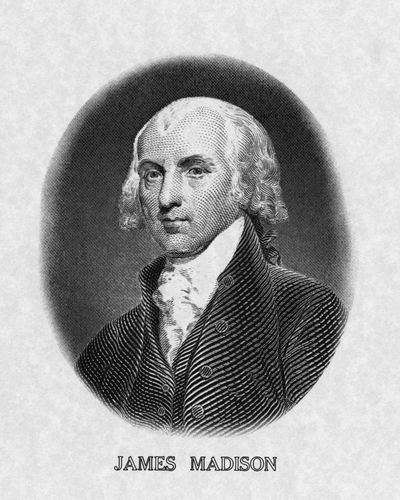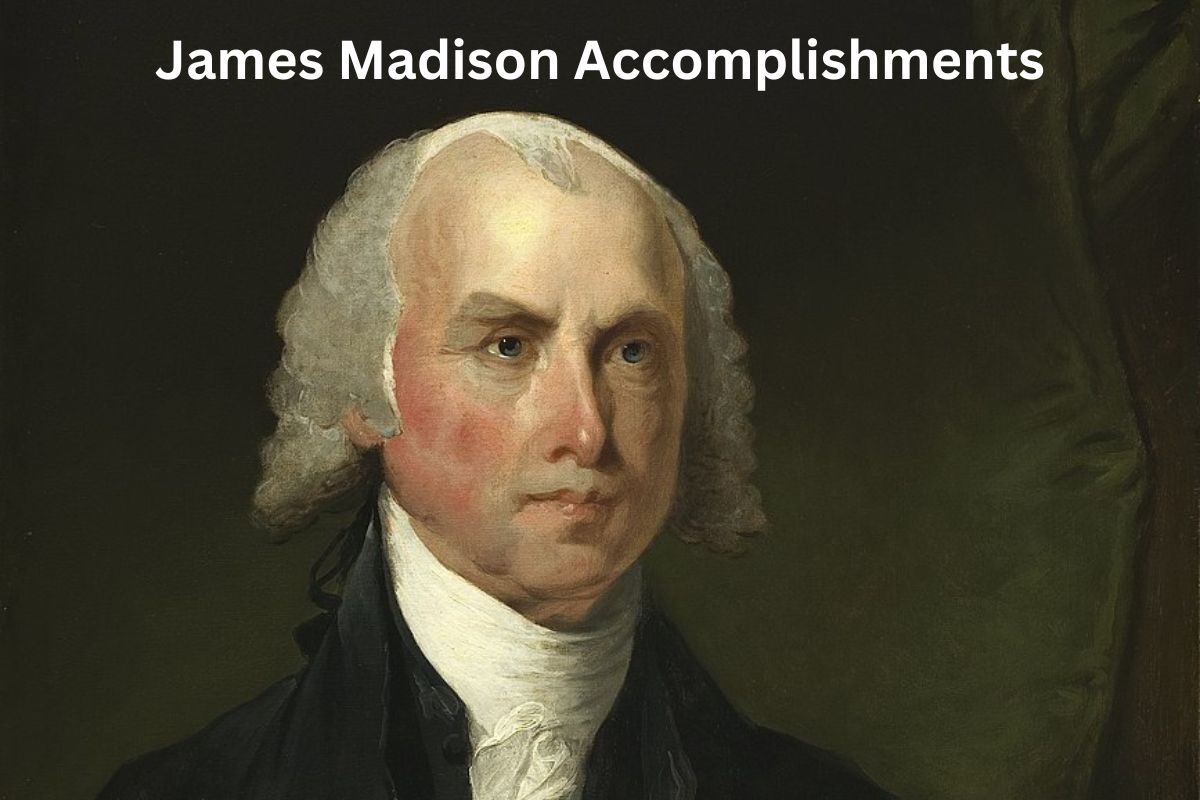James Madison was one of the Founding Fathers of the United States and a key figure in shaping the nation’s early years. Born on March 16, 1751, in Virginia, Madison is widely recognized for his contributions to the U.S. Constitution and his advocacy for individual rights and a strong central government.
He played a crucial role in drafting the Constitution, co-authored the influential Federalist Papers, and championed the inclusion of the Bill of Rights. Madison served as the fourth President of the United States from 1809 to 1817, leading the country through the challenging War of 1812.
He also left a lasting legacy as an advocate for religious freedom, a co-founder of the Democratic-Republican Party, and the visionary behind the University of Virginia. James Madison’s contributions continue to shape American governance and uphold the principles of liberty and democracy.
Accomplishments of James Madison
1. Co-author of the United States Constitution
James Madison played a pivotal role in the drafting and formation of the United States Constitution. He attended the Constitutional Convention of 1787 in Philadelphia and actively contributed to the discussions and debates.
Madison’s intellect, knowledge, and persuasive skills were instrumental in shaping the structure of the federal government and the balance of power between the states and the central authority.
He proposed the Virginia Plan, which laid the foundation for the structure of the Constitution, and his contributions greatly influenced the final document.

2. Writer of the Federalist Papers
Alongside Alexander Hamilton and John Jay, James Madison co-authored a series of influential essays known as the Federalist Papers. Published between 1787 and 1788, these essays were written to promote the ratification of the Constitution.
Also Read: Facts About James Madison
Madison authored the majority of the essays, including Federalist No. 10 and Federalist No. 51, which explored the importance of a strong central government, addressed the dangers of factions, and explained the system of checks and balances within the proposed Constitution.
The Federalist Papers remain one of the most significant sources for understanding the intentions and principles behind the Constitution.
3. Championed the Bill of Rights
As a member of the U.S. House of Representatives, James Madison proposed a series of amendments to the Constitution that would protect individual liberties and rights.
He drew upon his earlier work on religious freedom in Virginia and his study of state constitutions to draft a comprehensive set of amendments.
These amendments, known as the Bill of Rights, were introduced to Congress in 1789 and ultimately ratified in 1791. The Bill of Rights includes fundamental protections such as freedom of speech, religion, and the right to a fair trial.
Madison’s commitment to safeguarding individual freedoms played a crucial role in securing the ratification of the Constitution and ensuring the protection of civil liberties for future generations.
4. Served as Secretary of State
From 1801 to 1809, James Madison served as the Secretary of State under President Thomas Jefferson. In this role, he played a central role in shaping American foreign policy and expanding the nation’s territorial boundaries.
Madison was instrumental in negotiating the Louisiana Purchase in 1803, which doubled the size of the United States and secured access to the vital port of New Orleans.
He also worked to establish trade relations with other countries and negotiated treaties such as the Treaty of Ghent, which ended the War of 1812 between the United States and Great Britain.

5. Fourth President of the United States
James Madison served as the fourth President of the United States from 1809 to 1817. His presidency was marked by significant challenges, including the War of 1812.
Despite initial setbacks, Madison successfully led the country through the conflict, defending American sovereignty against British aggression and securing important victories such as the Battle of New Orleans.
His leadership during the war boosted national pride and helped solidify the United States as an independent and respected nation on the world stage.
6. Led the country during the War of 1812
As the President of the United States from 1809 to 1817, Madison was at the helm of the nation’s government during this significant conflict.
The War of 1812, often referred to as America’s “second war of independence,” was fought between the United States and Great Britain. It stemmed from a range of issues, including trade restrictions, impressment of American sailors, and British support for Native American tribes resisting American expansion.
During the war, President Madison played a crucial role in guiding the country’s response and leading the military efforts. He advocated for a strong defense of American interests and took measures to strengthen the military forces.
Madison authorized the expansion of the United States Army and Navy, and he worked closely with military commanders and advisors to develop strategies for defending American territory and asserting the nation’s sovereignty.
7. Founder of the University of Virginia.
James Madison played a pivotal role in establishing the University of Virginia, which remains one of the leading institutions of higher education in the United States.
As a lifelong advocate of education, Madison envisioned a university that would provide a broad-based liberal arts education and promote intellectual inquiry. He personally designed the curriculum, emphasizing a balance between scientific and classical studies.
The university opened its doors in 1825, and Madison’s vision of a public university based on the principles of intellectual freedom and academic excellence continues to shape its educational philosophy to this day.
8. Advocate for religious freedom
James Madison was a strong advocate for religious freedom and the separation of church and state. As a member of the Virginia General Assembly, he drafted and successfully lobbied for the passage of the Virginia Statute for Religious Freedom in 1786.
This groundbreaking legislation, influenced by Madison’s earlier writings, established religious freedom as a fundamental right and prohibited the government from favoring one religion over others.
The principles of religious freedom articulated in the Virginia Statute later became the basis for the First Amendment of the United States Constitution, which guarantees the right to freedom of religion.
9. Supported the establishment of the First National Bank
James Madison supported Alexander Hamilton’s proposal to establish the First National Bank of the United States. As a proponent of a strong central government, Madison recognized the need for a national bank to stabilize the country’s finances and promote economic growth.
Despite initial reservations, Madison came to support the bank and believed it would provide a secure repository for government funds, issue a stable national currency, and facilitate commercial activities.
The establishment of the First National Bank in 1791 helped lay the foundation for a more robust national economy.
10. Co-founder of the Democratic-Republican Party
Alongside Thomas Jefferson, James Madison was one of the co-founders of the Democratic-Republican Party. The party emerged as a political force to oppose the policies of the Federalist Party, which they viewed as favoring elitism and a strong central government.
The Democratic-Republican Party advocated for strict interpretation of the Constitution, states’ rights, agrarianism, and a limited role for the federal government.
Madison’s involvement in the party helped shape its principles and policies, and his presidency from 1809 to 1817 was seen as a continuation of the Democratic-Republican agenda.
